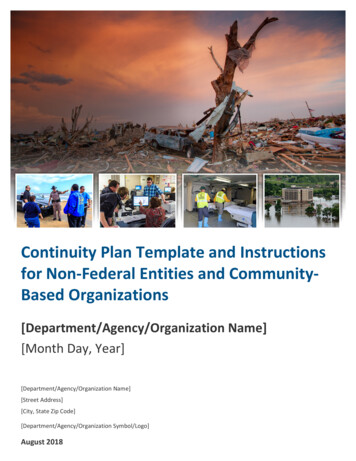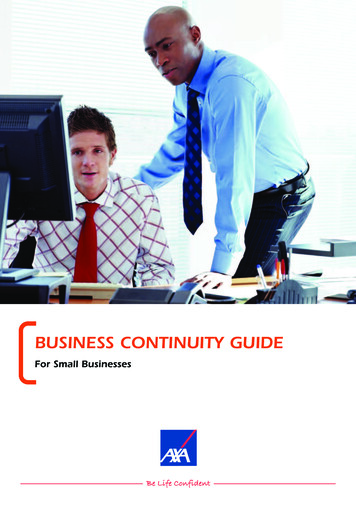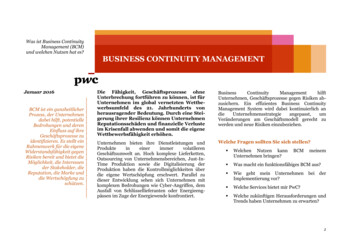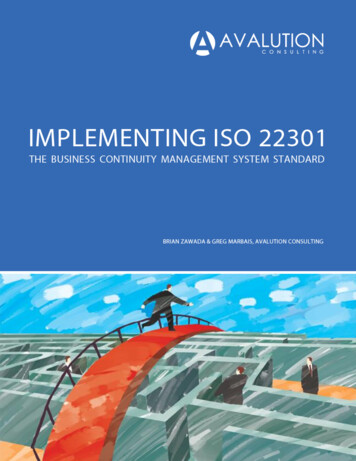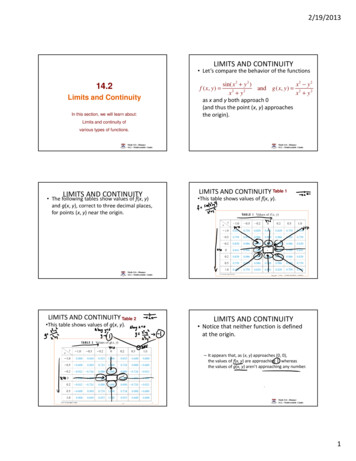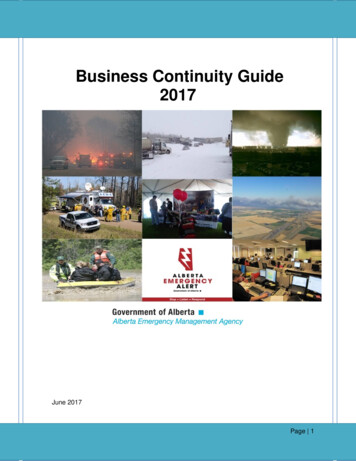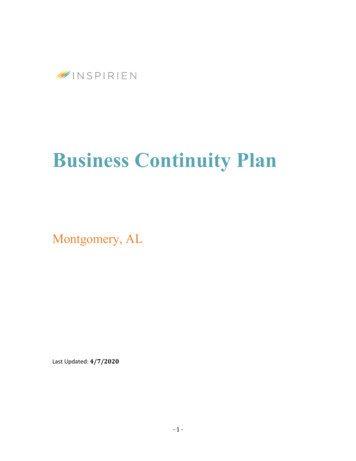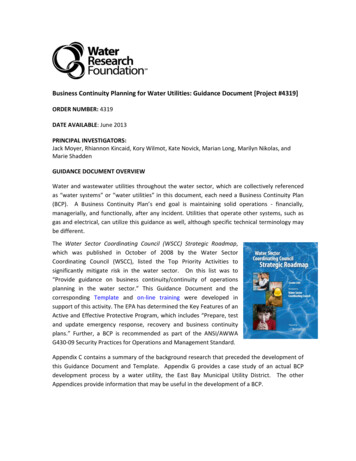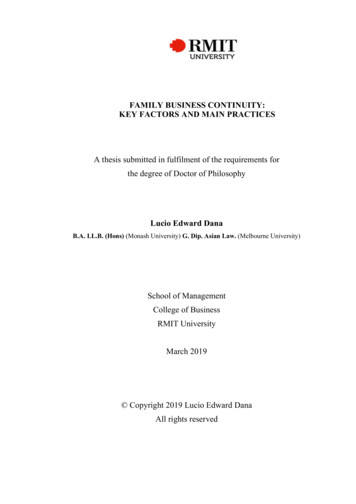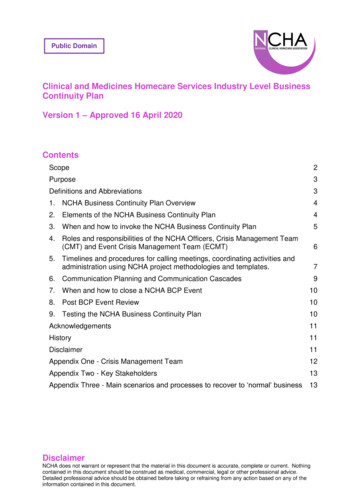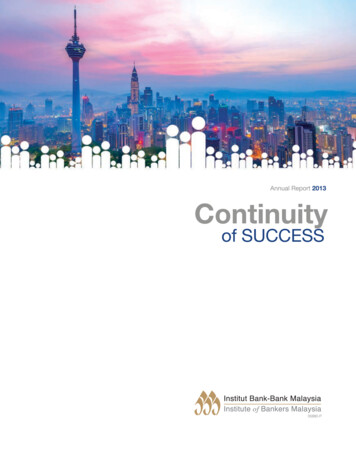
Transcription
INsidethis report002About IBBM004Corporate Information006Notice of Annual General Meeting008Council Members010Management Team013Chairman’s Statement020CEO’s Review0406081320026Summary of IBBM’s Programmesand Activities048International Engagement052Corporate Event Highlights058Reports & Financial Statements097Appendices113Form of Proxy114Form of NomineeCORPORATEINFORMATIONNOTICE OFANNUAL GENERAL EVIEWThemeContinuity of SuccessCOVER RATIONALEAt IBBM, we believe a world class education is crucial in order to be competitive in the banking and financialservices industry. Since our establishment in 1977, we have played a pivotal role in providing world classeducation and learning services as part of our mission to develop talent in Malaysia and across the region.As an industry leader, we set the highest standards of excellence in all that we do. Through the years, ourindustry focused professional programmes have equipped participants with the knowledge and skills they needto achieve business goals.Our aim is to be in the forefront in the advancement of the banking education landscape and we aredetermined to continue to further steer IBBM towards achieving even more success through innovations in thedevelopment and delivery of our value propositions.
CONTINUITY ofsuccessthis annual report is available online atwww.ibbm.org.mythAnnual General Meeting ofInstitut Bank-Bank MalaysiaMajestic 1 & 2, Level 3,The Majestic Hotel Kuala Lumpur,5, Jalan Sultan Hishamuddin,50000 Kuala Lumpur.Saturday, 31 May 2014 at 8.30 a.m.VISION MissionTo be regionally recognised as a leading learningsolutions provider in enhancing the competencies ofbanking and financial services practitioners in achanging environment.To be a professional and effective training adviserand provider in developing practitioners of bankingand financial services industry to enable them tofunction effectively in an evolving financial servicesenvironment.
aboutIBBMAnnual Report 2013The Institute of Bankers Malaysia (Institut Bank-Bank Malaysia or IBBM) is devoted toproviding world class education and learning services as part of its mission todevelop talent in the Banking and Financial Services Industry.WorldClassEducationEstablished in November 1977 as the professional educational body for thebanking and financial services industry in Malaysia, IBBM is governed by aCouncil comprising representatives from:002INSTITUT BANK-BANK MALAYSIAWe aim to be at the forefront in the advancement of banking education andlearning services; and are taking quantum leaps to reshape the bankingeducation landscape through innovations in the development and delivery ofour value propositions.Establised inNovember1977Bank NegaraMalaysiaThe Association ofBanks in MalaysiaAssociation ofFinanceCompaniesof MalaysiaMalaysianInvestmentBankingAssociationIBBM is committed to assist financialinstitutions empower their employees withnew knowledge and skills to achievebusiness goals. To meet this objective, IBBMhas formed strategic partnerships withrenowned business schools, universities,professional institutes, industry leaders,and specialised agencies to facilitate thetransfer of international best practices andknowledge. IBBM offers industry focusedprofessional qualifications both through itsown curriculum and awards, and incollaboration with other professional bodiesand educational institutions.
IBBM’s Continuing Professional Development (CPD) programmesprovide a training progression that systematically equips participants with the skillsthey need as they progress in their careers. Not only are the programmes localised,customised and comprehensive; they cater to various levels in the bankingMeeting trainingneeds of theindustryand financial services sector.The Institute continues to design, develop and deliver CPD programmes thatare based on the training needs of the Industry and are in line with the Banking andIndustry Competency Framework in order to enhance our learning, educational andqualification portfolios.003ContinuityofIBBM also plays the role of an adviser to assist financial institutions orfinance related organisations in aligning education and training propositions tothe career development of their talent.Online LearningManagementSystemSuccessDissemination of information on banking and financial services is done via thoughtleadership events, as well as through print, electronic and online platforms.Leveraging on technology, the “IBBM Online” Learning Management Systemprovides a virtual education and learning environment that facilitates and promotesself-directed learning.
CorporateInformationChairmanTan Sri Azman Hashim, FIBMChairman, AmInvestment Bank BerhadVice ChairmanAnnual Report 2013Datuk Abdul Farid Alias(appointed w.e.f. 17 December 2013)Group President/Chief Executive Officer,Malayan Banking BerhadCouncil MembersDonald Joshua Jaganathan, MIBMAssistant Governor, Bank Negara MalaysiaDato’ Sri Abdul Wahid Omar, FIBM(resigned w.e.f. 5 June 2013)Former President/Chief Executive Officer,Malayan Banking BerhadDatuk Yvonne Chia, FIBM(retired w.e.f. 1 July 2013)Former Group Managing Director/Chief Executive,Hong Leong Bank BerhadDato’ Charon Wardini Mokhzani, FIBM(resigned w.e.f. 4 November 2013)Former Chief Executive Officer,CIMB Investment Bank BerhadChief Executive OfficerTay Kay LuanTan Sri Dato’ Sri Tay Ah Lek, FIBM004Managing Director, Public Bank BerhadINSTITUT BANK-BANK MALAYSIADatuk Mohamed Azmi Mahmood,FIBMDeputy Group Managing Director,AMMB Holdings BerhadDato’ Zulkiflee Abbas Abdul HamidManaging Director/Chief Executive Officer,Affin Bank BerhadSecretaryLum Soo Yan, FCCA (MIA 24562)AuditorsSJ Grant Thornton(Member of Grant Thornton International)Chartered AccountantsDatuk Mohd Najib Haji Abdullah(appointed w.e.f. 28 January 2014)Group Managing Director/Chief ExecutiveOfficer, MIDF Amanah Investment Bank BerhadBankerMalayan Banking BerhadKung Beng Hong, FIBMDirector, Alliance Financial Group BerhadJeffrey Chew Sun TeongChief Executive Officer/Director,OCBC Bank (Malaysia) BerhadWong Kim ChoongChief Executive Officer,United Overseas Bank (Malaysia) BerhadTan Kong Khoon(appointed w.e.f. 17 December 2013)Group Managing Director/Chief Executive,Hong Leong Bank BerhadSolicitorSkrineRegistered OfficeWisma IBI5 Jalan SemantanDamansara Heights50490 Kuala Lumpur
Council CommitteesEducation CommitteeCouncil MembersDonald Joshua Jaganathan, MIBMChairmanTan Sri Dato’ Sri Tay Ah Lek, FIBMKung Beng Hong, FIBMCo-opted MembersChoo Yee Kwan, FIBM (Assoc)Country Chief Risk Officer,OCBC Bank (Malaysia) BerhadManaging Director/Chief Executive Officer,IBH Investment Bank BerhadJeffrey Chew Sun Teong(appointed w.e.f. 13 November 2013)Datuk Yvonne Chia, FIBM(retired w.e.f. 1 July 2013)Dato’ Charon Wardini Mokhzani, FIBM(resigned w.e.f. 4 November 2013)005General Purpose CommitteeDatuk Mohamed Azmi Mahmood, FIBM(Acting Chairman)Kung Beng Hong, FIBMJeffrey Chew Sun TeongWong Kim ChoongDatuk Johar Che MatAudit CommitteeDirector, Amanah Raya BerhadJeffrey Chew Sun TeongDr Zakariah Abdul Rashid(Chairman)Executive Director,Malaysian Institute of Economic Research(MIER)Datuk Mohamed Azmi Mahmood, FIBMWong Kim ChoongSuccessPresident/Chief Executive Officer,Asia e UniversityChairmanofProfessor Dato’ Dr Ansary Ahmed,FIBM (Assoc)Dato’ Zulkiflee Abbas Abdul HamidContinuityDato’ Howard Choo Kah Hoe,FIBM (Assoc)Human Resource Committee
Notice ofAnnual General MeetingAnnual Report 2013NOTICE IS HEREBY GIVEN that the 36th Annual General Meeting ofInstitut Bank-Bank Malaysia (Company No. 35880-P) will be held onSaturday, 31 May 2014 at 8.30 a.m. at Majestic 1 & 2, Level 3, TheMajestic Hotel Kuala Lumpur, 5 Jalan Sultan Hishamuddin, 50000Kuala Lumpur, for the following purposes:1.To receive the Audited Financial Statements of Institut Bank-Bank Malaysia for thefinancial year ended 31 December 2013 together with the Reports of the Counciland Auditors thereon.2.To receive the Audited Financial Statements of the Staff Training Fund for thefinancial year ended 31 December 2013 together with the Report of the Auditorsthereon.3.To note the appointment of the following nominees as Members of the Council forthe 2014/2015 term of office pursuant to Articles 60(a), 60(b), 60(c) and 60(d) ofthe Institute’s Articles of Association:006Article 60(a):INSTITUT BANK-BANK MALAYSIAArticle 60(b):4.Datuk Mohamed Azmi MahmoodArticle 60(d):Datuk Mohd Najib Hj AbdullahTo consider and if thought fit, to pass the following resolutions: ii. Ordinary Resolution 25.Ordinary Resolution 3Datuk Abdul Farid AliasDato’ Zulkiflee Abbas Abdul HamidJeffrey Chew Sun TeongWong Kim ChoongTan Kong KhoonArticle 60(c):i.Ordinary Resolution 1Donald Joshua Jaganathan“That Tan Sri Azman Hashim who retires pursuant to Section 129(6) of theCompanies Act 1965, be and is hereby re-appointed as Council member ofthe Institute to hold office until the next annual general meeting.”[Resolution 1]“That Tan Sri Dato’ Sri Tay Ah Lek who retires pursuant to Section 129(6) ofthe Companies Act 1965, be and is hereby re-appointed as Council memberof the Institute to hold office until the next annual general meeting.”[Resolution 2]To re-appoint Messrs SJ Grant Thornton as Auditors and authorise the Council tofix their remuneration. [Resolution 3]
6.To transact any other business duly notified. Such other business to betransacted shall be notified in writing to the Secretary, together with the names ofthe proposers and seconders, not less than ten (10) days before the date fixedfor the Meeting.It is hereby informed that a Member shall not be eligible for election to the Councilunless he/she is a Fellow or has been a Member eligible to vote for at least five (5)years pursuant to Article 60(e).The Membership Register of Institut Bank-Bank Malaysia is available for inspection atthe Institute’s registered address, Wisma IBI, 5 Jalan Semantan, Damansara Heights,50490 Kuala Lumpur.007By Order of the CouncilKuala Lumpur30 April 2014ContinuityLUM SOO YAN (MIA 24562)SecretaryofSuccessNOTES:Every Individual Member of Institut Bank-Bank Malaysia entitled to attend and vote at this Meeting is alsoentitled to appoint a proxy to attend and to vote in his stead. A proxy shall be a member entitled to vote. Theinstrument appointing a proxy (Form of Proxy printed on page 113 of this Annual Report) must be depositedwith the Secretary not less than forty-eight (48) hours before the time set for the Meeting or adjournedMeeting.Every Institutional Member of Institut Bank-Bank Malaysia is entitled to nominate one accredited representative(Form of Nominee printed on page 114 of this Annual Report) to attend and vote at all General Meetings.Alternate representatives may be appointed by such Institutional Members, but no Member may have more thanone accredited representative at one General Meeting. Every Institutional Member shall have one vote.
Annual Report 2013CouncilMembers008Tan Sri Azman HashimFIBMChairmanINSTITUT BANK-BANK MALAYSIADatuk Abdul Farid AliasVice ChairmanDonald JoshuaJaganathanMIBMTan Sri Dato’ Sri Tay Ah LekFIBMKung Beng HongFIBM
Jeffrey ChewSun TeongDatuk Mohamed AzmiMahmoodFIBM009Tan Kong KhoonSuccessWong Kim ChoongofDatuk Mohd NajibHaji AbdullahContinuityDato’ Zulkiflee AbbasAbdul Hamid
Annual Report 2013ManagementTeamLum Soo YanHead, Finance & OperationsINSTITUT BANK-BANK MALAYSIA010Tay Kay LuanCEOChow Oi LiHead, ResearchHartinah AnnuarActing Head, Curriculum
Susan Lee Yoon LianRafizah Abdul RahmanHead, EducationHead Designate, CorporateCommunications011ContinuityKristine Anne WilliamsofHead, Marketing & PromotionsJagdeeshpal KaurHead, DeliveryManager, Human ResourcesMithila SathasivamHead, MembershipSuccessTerence Chong Wai Meng
elVaeblFacilitating the transferof knowledgeAs the professional educational body for the bankingand financial services industry in Malaysia, wefacilitate the transfer of knowledge and skills byworking closely with financial institutions to design,develop and conduct programmes that ensure effectivecontributions to the industry.
013Tan Sri Azman ment
Annual Report 2013Chairman’sStatementINSTITUT BANK-BANK MALAYSIA014In the 2012 Annual Report, I hadmentioned how Malaysia, and indeedmost of ASEAN, had been spared thebrunt of the global financial downturn.Over the last year, it has becomeapparent not only that this regionescaped relatively unscathed from thewrath of failing economies, but that it hasemerged as a key driving forcesupporting the global economic recovery.While this, of course, is very positivenews for countries in the region,economic wealth brings with it its ownset of challenges. For a start, it meansgrowing middle classes with greaterpersonal wealth and disposable income,which would need to be met by moresophisticated banking services in therespective countries.In Malaysia, which already has a sizeablemiddle class, the Government’s EconomicTransformation Programme is drivinggreater development across all 12National Key Economic Areas outlined.This will drive demand for funding fromcorporations, which brings with it inherentcredit risk. At the same time, the risingcost of business compounded bycompetition for better yields, a talentshortage and rising consumerconsciousness lend to pressures beingfelt by banks and financial institutions.Competition, which has so far beenconfined by and large to the domesticsphere, will soon be extended once theASEAN Community takes effect in 2015,bringing with it the free flow of capitaland funds across borders within theregion.Coupled with these challenges, Malaysianbanking institutions have to comply withincreasingly stringent international andlocal regulatory requirements such asthose of Basel III, as well as the FinancialServices Act 2013 and Islamic FinancialServices Act 2013 introduced by BankNegara Malaysia and which came intoeffect in June 2013.Over and above these financial andregulatory considerations, the bankingindustry in the West in general hasundergone severe reputational damage asa result of various events that haveunfolded since the global economicmeltdown in 2008, including the subprimecrisis in the US and the failure of leadinginstitutions. Much work needs to be doneto restore the public’s loss of confidencein the integrity and capabilities of thefinancial industry to act as custodians ofassets.It is, for all intents and purposes, a verychallenging time for financial and bankinginstitutions internationally, regionally anddomestically, which calls for afundamental review of the sustainabilityand integrity of business models, areassessment of levels of professionalismand ethics, and capacity development toensure that human resources are suitablyequipped with the relevant skills and levelof integrity to take the industry to ahigher level of excellence. The Institute ofBankers Malaysia (IBBM) has taken activesteps to ensure these needs will be metwithin the Malaysian environment.RE-POSITIONING OF IBBMIBBM has continuously revisited its rolestowards meeting both the training andeducational needs of bankers in thecountry, as well as to upholdprofessionalism in the industry. Since2011, when IBBM embarked on atransformation journey to attain worldclass standards, it has becomeincreasingly apparent that in order tocarry out both functions to the best ofour abilities, it would be necessary toseparate education and development fromits role as a robust membership basedprofessional body.
015ofSuccessThere are many advantages of such ademarcation of functions. One is greaterindependence of the professional body,which would strengthen the advocacy ofthe highest standards of accountability,ethics and integrity; and its integrationwith the development of the professionalcurriculum, examinations and awardscertification. Another is to ensure focusand avoid any possible conflicts ofinterest. The arrangement allows AICB toappoint other education and trainingproviders should the need arise, thuskeeping ABS competitive and innovativein addressing training needs.This blueprint, which is close to being finalised,states among its given 8 recommendations thatIBBM be split into two separate entities – tooversee the training and educational aspects ofbankers and to look into elevating and maintaininginternational benchmarks within the industry.ContinuityA Steering Committee, headed by BankNegara Malaysia Deputy Governor, Dato’Muhammad Ibrahim, was thus establishedto analyse what was needed and tomake recommendations forimplementation, resulting in the drafting ofa Blueprint for Transformation of theMalaysian Banking Education Landscape.This blueprint, which is close to beingfinalised, states among its given 8recommendations that IBBM be split intotwo separate entities – to oversee thetraining and educational aspects ofbankers and to look into elevating andmaintaining international benchmarkswithin the industry. Consequently, on 18December, the Asian Banking School(ABS) was formed and IBBM was repositioned as the Asian Institute ofChartered Bankers (AICB) – both withdistinct roles and governance structures.Although these two entities have beenofficially launched, there is still a need tofinalise the governance structures of bothand to put together an experienced andhighly capable management team tooversee ABS. Much thought and effortsare being channelled into bringing to lifethe separate entities by 2015.
Annual Report 2013Chairman’sStatementINSTITUT BANK-BANK MALAYSIA016During the year, workshops wereconducted for the management of FSTEPas well as members of the QAC to helpthem further enhance the programme.THE CHARTERED BANKER AS AKEY STANDARDOnce IBBM is officially rebranded asAICB, we will focus on the CharteredBanker qualification as a centralrequirement for all future members as thisgold standard in global banking wouldnecessarily elevate professionalism in theindustry to levels that would support itssustainability while restoring faith inbankers’ capabilities.As it stands, seven member banks havesigned Memoranda of Understanding(MoUs) with IBBM to enrol theirexecutives into the Chartered Bankerprogramme and we expect this numberto further increase in 2014 and the yearsto come. Interest shown in thisprogramme is not limited to our shores.IBBM, to date, is the only organisation inthe region to offer the globally recognisedChartered Banker qualification, so seriousenquiries from banking and financialinstitutions in neighbouring countries tooffer this programme in their marketshave been encouraging.To date, we have attracted much tractionfrom the emerging markets of theMaldives, Vietnam and Cambodia whileworking on similar arrangements withother interested countries. In other words,this qualification is adding to ourinternational repute and enabling us tolive up to our new brand promise ofproviding professional services tomembers from the region.While our value proposition will beginwith the Chartered Banker EducationPathway, it will not end there. Ourobjective is to keep providing updatedand relevant offerings to our members toenable them to continue their professionaldevelopment, thus serving not only toenhance individual careers but alsostandards within individual bankinginstitutions and the industry generally.
DEVELOPING FRESH TALENTSuccessTo date, we have trained a total of 1,351young executives under the programmeand it personally gives me much pleasureto see how FSTEP provides invaluablecareer opportunities to hundreds ofdeserving individuals, while the industrygains from absorbing young talent whohave been trained to contribute in ameaningful way to further thedevelopment of the banking and financialsector.ofLike all our programmes, FSTEPcontinues to evolve to be more relevant,focused and effective. The programmecontent and structure are determined bya Quality Assurance Committee (QAC)which is elected every six months. Duringthe year, workshops were conducted forthe management of FSTEP as well asmembers of the QAC to help them furtherenhance the programme. Among therecommendations made was arealignment of the programme to avoidthe overlap of training topics which inAnother significant change in theadministration of FSTEP was enrolment ofour first nine foreign participants in the2013 intake. This is in keeping withIBBM’s greater focus on regional activity,while supporting the initiatives of ourmember banks in expanding theirpresence within the region. The inclusionof other Asian counterparts would,moreover, widen the exposure of youngMalaysian bankers to regional culturesand sensitivities which would serve themwell as ASEAN boundaries progressivelydisappear.017ContinuityTalent shortage continues to be one ofthe key challenges the industry faces.Since 2007, we have been addressingthis issue via the Financial Sector TalentEnrichment Programme (FSTEP), ayear-long initiative targeted at freshgraduates or those with less than threeyears’ working experience that introducesthem to the basics of the financialservices industry. The aim is, at the endof the programme, for these carefullyselected graduates to demonstratesufficient ability and interest in theindustry to be offered employment byone of our sponsoring financialinstitutions.effect shortens its technical trainingcomponent from six months previously toa possible four months, with the rest ofthe time freed for internship at asponsoring financial institution.
Annual Report 2013Chairman’sStatement018INSTITUT BANK-BANK MALAYSIAACKNOWLEDGEMENTSThe Institute of Bankers Malaysia is at a very interesting phase in ourongoing journey, approaching a critical turning point by evolving intoABS and AICB. For all the preparatory work that has gone into thisimpending transition, I would like to express my gratitude to theSteering Committee, and especially its Chairman, Dato’ MuhammadIbrahim, Deputy Governor of Bank Negara Malaysia, and his CommitteeMembers for guiding our transformation and presenting us with clearguidelines going forward.At the same time, I would like to acknowledge the constant support ofBank Negara Malaysia and other regulatory bodies including whendealing with governance and administrative issues.I would like to express my sincere appreciation of the commitment bythe team at IBBM, commendably led by Chief Executive Officer, TayKay Luan, as well as the contributions and support of my fellowCouncil Members for their time and dedication to the Institute. We havecome a long way in our 37-year journey. With your continued efforts, Ihave every confidence that we will now surge ahead with our newidentity, our reinforced brand positioning and our enhanced valuepropositions.Tan Sri Azman HashimChairman
oping long-termrelationshipsWe are extending and developing long-termrelationships and engagement with key partners inthe banking and non-banking sectors. This willfurther entrench our position as a leading learningknowledge provider in the region.
Tay Kay LuanAnnual Report 2013Chief Executive OfficerINSTITUT BANK-BANK MALAYSIA020ceo’sreview
The banking sector is undergoing rapidchanges globally as well as here inMalaysia. To keep pace with thesedevelopments and indeed to be ahead ofthe changes taking place in the Malaysianfinancial landscape, the Institute ofBankers Malaysia (IBBM) embarked on afive-year transformation journey thatstarted in 2011. Today, mid-way throughthis journey, I am pleased to say, wehave made considerable progress and arewell on track towards achieving the endgoals that we had set.021For all intents and purposes, it has beena very significant year where weexperienced continuity of success atIBBM and it gives me pleasure to presenta review of our wide range of activities.ENHANCING THE INTELLECTUALCAPITAL OF THE INDUSTRYSuccessWhile working on the formation of ABSand AICB, which are to be functional by2015, we did not neglect our otherobligations. If anything, the year saw usbuild on the many successes achievedover the last 3 years of growth andincreased efforts towards enhancing theAmong the highlights were positiveoutcomes of concerted efforts to marketthe Chartered Banker programme bothdomestically and in the region, as well asorganising the second edition and highlysuccessful Asian-Pacific Association ofBanking Institutes (APABI) RegionalConference, which drew almost 500participants and speakers from 14countries to discuss pertinent issuesfacing the industry.The year got off on a positive note withcompletion of the accreditation processof our Chartered Banker programme byour joint examiners, the Chartered BankerInstitute from Scotland. The programmecomprises three levels of which we havelaunched the first level – the ExecutiveBanker – while developing the learningmaterials for all seven modules of thesecond level – the Professional Banker– which we aim to launch in the thirdquarter of 2014, followed soon after bythe final level, which will qualify acandidate as a full-fledged CharteredBanker.ofBy separating the educational andprofessional arms of IBBM, we will beable to lend more focus on both areasindividually and will be better positionedto offer greater value propositions ineach. The inclusion of the word ‘Asian’ inthe names of both organisations was notincidental; rather it reflects the forwardthinking of our Council to be in line withthe expanding regional footprint of ourinstitutional member banks but moreimportantly to embrace the trend towardsa much more cohesive and regionalidentity of the economies.intellectual capital of the industry, servingour members better, and establishing afirmer footprint in the region; and in theprocess enhancing our own reputation asa thought leader in the critical areas ofbanking and finance.ContinuityAmong the key objectives of ourtransformation are to re-align oureducational product propositions toensure they remain relevant to marketneeds; and to play a leadership role inelevating the level of professionalism ofthe banking sector, not just in Malaysiabut regionally. On 18 December 2013, wemade a major milestone achievementtowards these ends, when the AsianBanking School (ABS) was officiallylaunched and IBBM was renamed AsianInstitute of Chartered Bankers (AICB) toreflect our new strategic direction.I am pleased to say, we have made considerableprogress and are well on track towards achievingthe end goals that we had set.
Annual Report 2013CEO’sReviewINSTITUT BANK-BANK MALAYSIA0227MoUswith banks27,184Participants in 2013Concerted efforts to market theChartered Banker programme led to thesigning of Memorandums ofUnderstanding (MoUs) with six banksduring the year – AmBank, Maybank (forall IBBM qualifications), CIMB Group,Public Bank, Affin Bank and RHB –under which we will offer theiremployees special learning support forthe qualification. Along with StandardChartered, which had signed a MoU withus for the same purpose in 2012, wenow have seven banks committed toraising the level of professionalism oftheir executives via certification underthis programme. To afford them theflexibility to fit their studies with theirwork commitment, they have up to threeyears to complete the three modules forthe first level Executive Banker. We arepleased to share, however, that fourcandidates have so far completed allthree modules, one of whom managedto do this in just one sitting.Regionally, we have had marketingsuccesses in the Maldives andCambodia. The Maldives MonetaryAuthority signed up 20 young bankersfor the Executive Banker programme;while in Cambodia, following theprogramme launch in Phnom Penh on 18September, we have been collaboratingwith the Cambodian Institute of Banking(CIB) of the Association of Banks inCambodia (ABC), to offer thequalification there. Meanwhile, we havecontinued to enhance existing learningprogrammes by making them morerelevant to the current financiallandscape and its needs. The newversion of the Credit CertificationProgramme, re-branded as theProfessional Credit Certification (PCC),was launched on 15 June 2013 whenthe first level of the certification – theCertified Credit Executive (CCE) award– was opened for enrolment. Withstudent performance in mind, we areworking with Wiley publishing to upgradethe syllabus content design and standardthrough the development of new studytext, self-learning aids, as well as aquestion bank for examinations.At the same time, our collaboration withthe Ateneo Center for ContinuingEducation (CCE)/Bankers Association ofthe Philippines Institute of Banking(Ateneo-BAP) on the development of atwo-level Professional Bank RiskManagement Certification is makingsteady progress. The programme,targeted at mid-level management incredit risk and operations, is expected tobe ready in 2015.Keeping pace with regulatory changes,we revised the contents of the InvestorProtection Professional Certification (IPPC)and the Pasaran Kewangan MalaysiaCertificate (PKMC) Module I examinationsyllabuses to include new guidelinesissued by the Securities Commission on28 December 2012 on Sales Practices ofUnlisted Capital Market Products, PrivateDebt Securities and Sukuk.To drive growth, we not only focused oncourse content but also the delivery of ourprogrammes with the ultimate objective offacilitating the process of knowledgeacquisition and progressing the professionaldevelopment of individuals in the industry.Towards this end, we introduced a blendedlearning ecosystem for our programmeswhich combines online learning withassessment of English Languageproficiency and exam preparation to beconducted by our training providers. Todate, we have applied the blended learningsystem to the Executive Banker programmeand CCE; and intend to extend it to allprogrammes offered in due course.A total of 1,090 public and in-houseprogrammes were conducted in 2013,representing a steady 3% increase from1,055 p
Hong Leong Bank Berhad dATO' sRI ABduL wAhId OmAR, FIBm (resigned w.e.f. 5 June 2013) Former President/Chief Executive Officer, Malayan Banking Berhad dATuk yVONNe ChIA, FIBm (retired w.e.f. 1 July 2013) Former Group Managing Director/Chief Executive, Hong Leong Bank Berhad dATO' ChARON wARdINI mOkhzANI, FIBm (resigned w.e.f. 4 November 2013)
